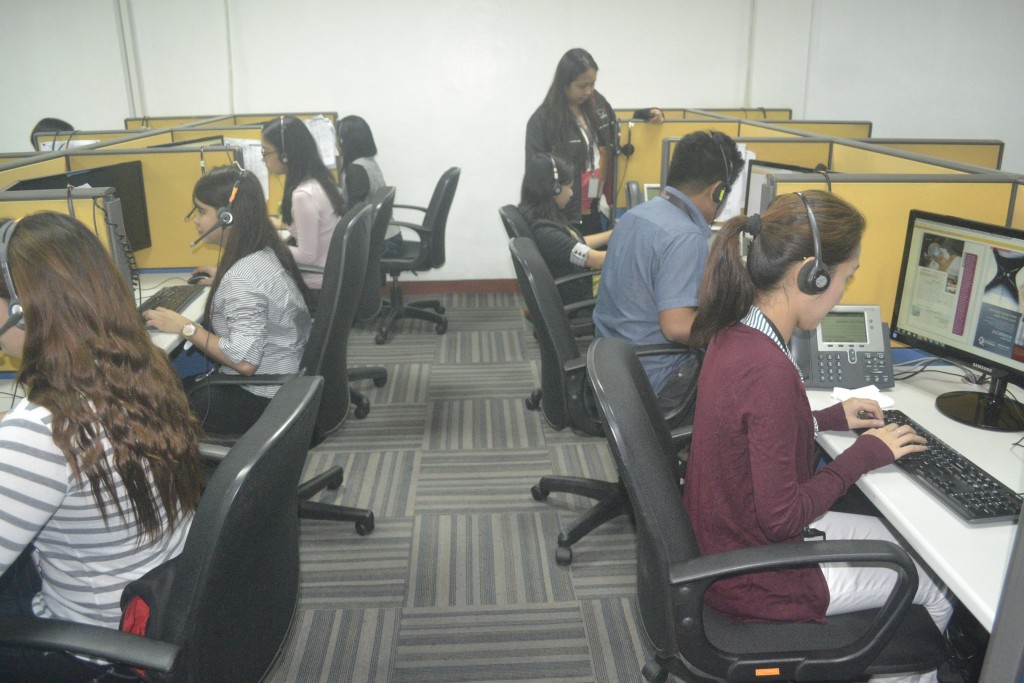LEGAZPI CITY—When people talk of Albay, what immediately comes to mind is majestic Mayon Volcano. Then food: “Bicol express,” pinangat or laing, sili ice cream and the iconic pili nut cooked every which way.
While tourism has been getting much of the attention in Albay, it has a silent booming industry providing a higher-than-minimum wage for salaried workers in the province: Information and Communication Technology (ICT).
With the emergence of about 20 major ICT players retaining a total of about 8,000 employees, the local ICT industry is growing fast and poised for even more growth. Salaries, according to industry insiders, range from P10,000 (entry level) to over P30,000 a month—premium pay for a province where the minimum wage is pegged at only P260 a day or an average of P7,000 a month.
Giving impetus to the industry are five major players: software developers, Internet service providers, telecommunication companies, educational institutions and, not least, the Business Process Outsourcing (BPO) sector.
First BPO
Over 20 years ago, the forerunner of the BPOs came to Albay.
Japanese-owned Matsuoka Projects-Phil. Inc., an architecture CAD (computer aided design) firm that speeds up documentation of architectural drafting and design, was put up in Legazpi City in 1993. It was followed by Content Online Services, Inc., a data processing company, in 1999.
It was only in the last five years, however, that the BPOs as we know them now started to come in.
(The BPO sector is categorized into voice and non-voice. The range of services includes call centers, health care, animation, game development and software development.)
The BPO players in Albay include Sutherland Global Services (call center, data processing); Nolin BPO Services (call center, data processing, accounting); One Half Phil. (call center, accounting); All Nation e-Language Conversion (data processing); SLTCFI BPO Incubation Center (call center, search engine optimization); Dataquest (medical transcription); RAB Out Sourcing Solutions (call center); MTC Academy (medical transcription and M3 Medical); Management Service Group (medical transcription); BDPO Solutions (call center, web development); Mayon Outsourcing Solutions (call center, data processing); Equinox Virtual Solutions (call Center, SEO); and Times Telecom Phil. (call center).
Albay also hosts software development (CORE IT) Service companies, which are engaged in analysis and design, programming and testing, customization, reengineering and conversion, installation and maintenance, education and training of systems software, middleware and application software. These companies are BDPO Solutions, Mayon Outsourcing Solutions, and Equinox Virtual Solutions.
The BPOs are all located in Legazpi City and the adjoining town of Daraga and in Tabaco City, about 10 kilometers from Legazpi.
Dindo Nabol, ICT chief of the Department of Trade and Industry in Bicol, says most of the 50 or so educational institutions in Albay have been providing the BPOs with their manpower requirements. Five of these institutions—the state-run Bicol University and the private Aquinas University, Divine Word College of Legazpi, Ago Medical Education Center-Bicol Christian College of Medicine (AMEC-BCCM) and Bicol College—are fully accredited with the Commission on Higher Education (CHEd), while the rest are mostly schools offering short-term and technical courses that are accredited by the Technical Education and Skills Development Authority or degree course offerings accredited by CHEd.
CHED and Tesda statistics showed that in 2008, a total of 22,754 graduates finished various degree programs under CHED-accredited schools and universities, while 25,863 were Tesda graduates. But of this number, only 7,268 graduated from ICT-related subjects.
Bridging the gap
But the province has a “gold mine” of talents that could bridge the ICT gap, says Rosemarie Q. Rey. Because of these reserves, the industry in Albay is moving forward and has a bright future despite the challenges brought by natural calamities.
Rey, president of the Albay ICT Association Inc., (AICTA) and concurrent president of the National ICT Confederation of the Philippines, stresses the need to improve school curricula attuned to the needs of the industry so educational institutions could supply the industry players with skilled and professional ICT workers.
Rey, who also owns the Southern Luzon Technology (SLT) school, says that until recently, investors and ICT locators were discouraged from putting up their businesses in the province because of the perception that it was a calamity-prone area frequented by typhoons, floods, and volcanic eruptions. Investors were also concerned with the readiness, adequacy and reliability of infrastructure support facilities, specially power, she adds.
However, Rey says, this perception changed over the past five years, especially after Albay province was installed in the Hall of Fame of the Gawad Kalasag Awards (given out by the National Disaster Risk Reduction and Management Council) in 2012 for its Disaster Risk Reduction Management (DRRM) program and for constantly attaining its “zero casualty” goal during disaster operations.
Legazpi City, the economic and education center of the province that also received this year’s Gawad Kalasag Hall of Fame award in the city category, has proven to local and foreign investors that it is indeed a “liveable” city, Rey says. “The outlook of the industry is getting better as Albay, specifically Legazpi, is almost there and will soon be included in the Ten Next Wave Cities in the country.”
Tax holidays
Rey says the ICT industry in Albay is expected to grow further in the coming years because of the lower cost of doing business in Albay.
For one, she says, Albay is a Philippine Economic Zone Authority (PEZA) accredited area. It also offers economical rentals in offices and buildings; has lower ICT wage levels than Metro Manila; and has friendly local governments that provide tax incentives to investors.
Albay province and Legazpi City both grant investors tax holidays for three to four years, she says. With these incentives, Rey says, the industry projects that about three to five new players will enter Albay every year.
Moreover, she says, Albay gained recognition as an important ICT area when AICTA hosted the National ICT Summit on Oct. 23 and 24 this year, in Legazpi City. Mar S. Arguelles, Inquirer Southern Luzon


